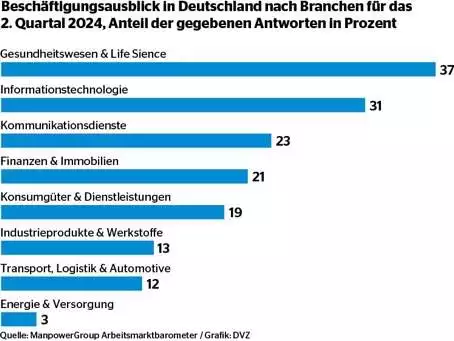Many logistics companies are responding to the economic downturn with recruitment freezes and cost cuts. But there is another way. A plea for more courage and foresight in logistics.whitewater rafting only works as a team. If one place is unoccupied, the boat is in danger of capsizing. Logistics companies are facing a similar situation in the current difficult market environment. Good employees must be retained.
The past few years have been good years, and many logistics companies have built up their workforce. However, the present is characterized by recession risks and geopolitical tensions. Logistics companies are therefore under considerable economic pressure.
In day-to-day business, this manifests itself in the psychological phenomenon of loss avoidance. This means that top management cuts costs. The result is a hiring freeze and cost-cutting programs. The fatal thing about this is that when the next upturn comes, this short-sighted strategy harbors considerable risks of losing touch with the competition in the long term and missing out on market opportunities.
Maersk, for example, has cut around 6,500 jobs worldwide since the beginning of last year. Sometimes such painful changes are necessary for future positioning. Sometimes those responsible follow capital market interests too closely. Maersk, however, emphasizes that there is no hiring freeze, but that the process for hiring new employees is being made more rigid. This is a small but very important difference. Because Maersk also knows that it would be negligent to close the door to top talent per se.
Significantly fewer new hires
According to the Manpower Group's labor market barometer, the willingness to hire new employees in the next three months is declining noticeably. The transportation, logistics and automotive sector is feeling the effects of geopolitical conflicts and disrupted supply chains particularly strongly. With a net employment outlook (NBA) of 12%, the sector's hiring intentions have deteriorated noticeably; compared to the previous quarter, the figure corresponds to a drop of 11 percentage points. In a year-on-year comparison, it is a drop of 10 percentage points. The NBA compares the number of positive and negative employment reports. Across all sectors, the seasonally adjusted NBA for the second quarter of 2024 is 17%. The figure therefore fell moderately by 3 and 9 percentage points compared to the same period last year and the previous quarter.

Market opportunities despite recession
The latest Gallup study on employee retention was also recently published, and it does not bode well. The key finding: employee retention has never been as low as it is today; around four in ten employees are actively looking for a new job. Only 14 percent feel emotionally attached to their company.
Even if the figures in the logistics environment and the associated companies may vary slightly upwards or downwards, the fact is that these worrying developments are definitely also affecting key players in the industry.
Research shows that companies should consciously take a different path in such times. This requires courage: namely to consciously invest, for example in retaining the best employees, not stopping necessary technical investments, disproportionately increasing salaries - for example for top performers who must not be allowed to leave the company during the crisis. The best companies do not cut budgets, but shift them and deliberately take a riskier path than others. After all, top performers in particular do not want to work for a company where fear is a permanent state of affairs and where this is clearly demonstrated by hiring freezes and cost cuts.
Bureaucracy drives staff away
However, this is by no means the most important reason for the high risk of churn in German companies. Rather, the decisive factor is that employees, regardless of their level, are slowed down in their actual drive and restricted in their willingness to perform. This is mainly due to the fact that considerable control bodies are installed. A very small number of managers from the top and middle management levels have the power to decisively influence the working lives of the remaining 98 percent of employees with just a few control mechanisms, either enriching or poisoning them. In times of geopolitical crises, this reflex to increase control is all too human. However, it is fatal for competitive strength. Two examples will underline this.
There is the managing director of a logistics company with an annual turnover in the three-digit million range who has instructed his managers to freeze any salary increases, for whatever reason. How is a managing director supposed to live up to his claim if he is literally not allowed to run his business? Especially in uncertain times, the salaries of those who make two to four times as much as the others should be increased disproportionately. After all, the most important employees must remain on board. Due to the shortage of skilled workers, headhunters and companies are very active in luring others away with sometimes tempting sums.
Secondly, there is the head of sales of a logistics group worth billions, who has now issued a travel ban for all employees in Europe due to excessive travel costs incurred in the past. Not even the highly paid, 20-strong key account and product team is allowed to meet in person to work out strategies. That would be like a rowing eight deciding, after a difficult year, that everyone should train at home on the rowing machine and all join together via video for training. It goes without saying that they are unlikely to win races this way, or only if they are lucky.
Giving employees confidence
But there is another way. Many people talk about values, be it reliability, discipline or diversity. What is needed now, however, is a willingness to take risks. It even needs to be actively encouraged.
In concrete terms, this could mean that every employee from administrator level to board member receives their own budget, which they can and should manage. It can be regulated in such a way that further approval only has to be obtained from a certain level upwards. Within their scope, employees can then decide freely whether to issue a credit note to a customer for an invoice error, for example, instead of waiting three weeks for approval.
A different error culture is needed
If companies want to be customer-obsessive, then a complaint must be dealt with quickly, otherwise someone else will take care of it, in case of doubt the competitor. And if a mistake happens, then that's just the way it is. In case of doubt, this error will cost some money. But it is still much cheaper than losing a talented person who cannot develop freely and quits out of frustration at bureaucratic thumbscrews. Because then a successor has to be found and trained, which is always more expensive.
Not everyone can or wants to take on this new responsibility. It is therefore important to get employees used to the new error-learning culture and to gradually move away from the error-avoidance culture. This is best achieved when employees themselves have a say and are seriously involved in the process. You can simply ask them what decision-making authority they need to do their job better. Frontline employees, who have a high added value because they are in direct contact with customers, often know best what demotivates them and what they need to be more motivated. What is the risk here?
Thanks to their increased motivation, they can deliver a potentially game-changing idea that is better than that of the management and would otherwise have remained hidden forever - or benefit the competitor through migration. If you want to cut costs, then you should do it in a more productive way.

